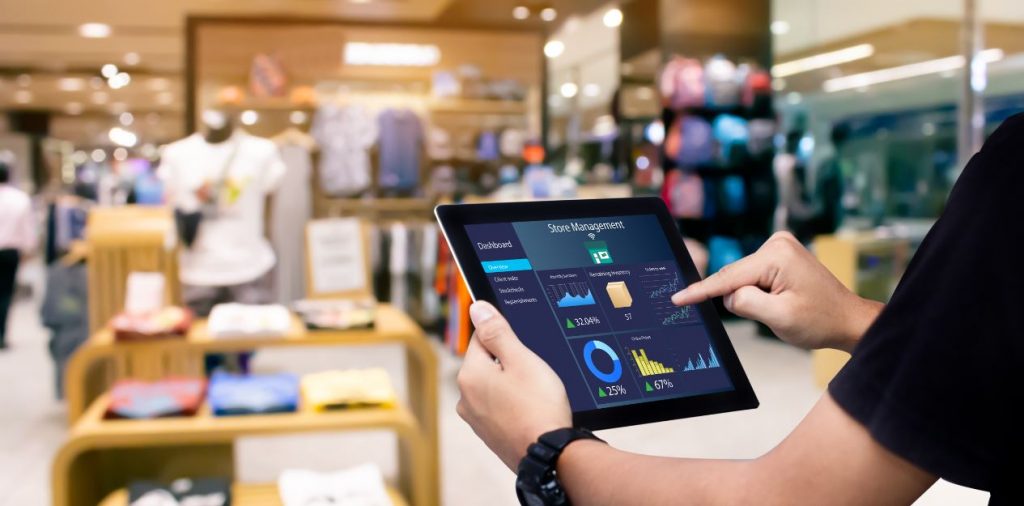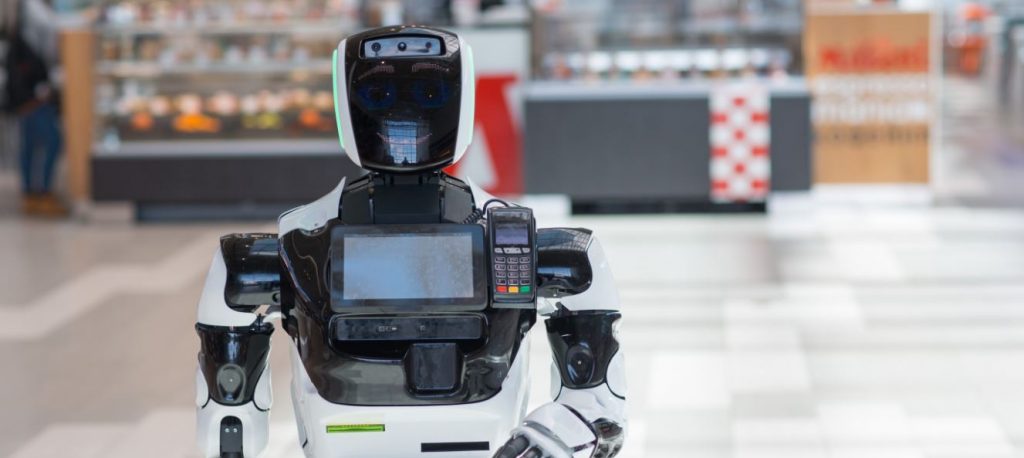The Future of Retail: Integrating AI and Machine Learning into POS Systems
The Future of Retail: Integrating AI and Machine Learning into POS Systems

Retail stores have changed a lot in recent years with more use of advanced technology. Point-of-sale (POS) systems help run stores by making sales and keeping track of inventory. But traditional POS systems can be slow and hard to use. To fix this, stores are adding artificial intelligence (AI) and machine learning (ML) to POS systems. This makes them smarter and easier to use.
Artificial Intelligence (AI) and Machine Learning (ML) in POS systems can:
•Speed up checkout times and reduce errors
•Give customers personalized offers and recommendations
•Automate routine tasks for workers
But adding artificial intelligence (AI) and machine learning (ML) is complicated. Stores must:
•Get the right systems and train the technology
•Protect customer data privacy
•Make sure workers have the right skills to use new systems
Many stores are testing artificial intelligence (AI) and machine learning (ML) to improve the shopping experience. In the future, these technologies will likely transform how retail works and how customers shop. AI and ML in POS systems could make going to stores faster, easier, and more personalized.
The Role of POS Systems in Retail

Point-of-sale (POS) systems are very important for the smooth running of stores today. A POS system includes the hardware and software used to process purchases, manage stock, and collect data on sales and customers.
POS systems make it easy for store staff to handle sales by providing an user-friendly interface to process transactions, scan items, and accept payments. They also provide up-to-date stock info, helping retailers monitor what products they have, how sales are going and which products are selling well and which aren’t. This info is crucial for good stock management so stores have enough products to meet demand while keeping costs down.
POS systems also collect useful customer data. By gathering info on what customers buy, retailers can gain valuable insights into customer behavior like buying habits, preferences and trends. This data can be used to create targeted marketing campaigns, improve product choices and enhance the overall customer experience.
Additionally, POS systems can streamline store operations by automating tasks and reducing manual work. For instance, automatic price updates, staff management and reporting can help retailers save time and work more efficiently.
In summary, POS systems play an essential role in retail as they make transactions easy, provide stock data and gather customer insights to help retailers improve operations and provide a better customer experience.
Artificial Intelligence and Machine Learning in Retail

Artificial intelligence and machine learning can transform the retail industry. They can help stores work more efficiently, save money, and improve customer service.
AI and ML have many uses in retail. They can help manage supply chains, do marketing, and help with sales.
AI and ML can improve point-of-sale (POS) systems. For example, AI-powered POS systems can recommend related products customers might like based on what they bought before. They can analyze what customers say to improve products and services.
Machine learning models can study sales data to help with inventory. They can predict demand based on past sales and seasons. This can help stores order the right amount of things and avoid running out.
AI and ML can also spot fraud and secure POS systems. Facial recognition can confirm who customers are during transactions. Machine learning models can notice suspicious activity and flag possible fraud attempts.
Overall, AI and ML in POS systems give stores new ways to improve their work, save money, and serve customers better. Using AI and ML can help stores stay ahead and meet customers’ changing needs.
Benefits of Integrating AI and Machine Learning into POS Systems

POS systems that combine AI and machine learning can help stores in many ways. Here are some benefits:
Customers have a better shopping experience. AI POS systems can suggest products based on what customers bought before and what they like. This helps stores build strong customer ties and keep customers loyal.
Inventory is managed better. Machine learning predicts demand and sees sales patterns. This helps stores cut inventory costs and avoid running out of stock.
Work is more efficient. AI and ML can do tasks like price updates and reports automatically. This lets store workers focus on other things and work faster.
Data gives useful insights. AI POS systems collect and study data on customers, sales, and inventory. This helps stores make better business decisions and improve operations.
Fraud is prevented. AI POS systems can spot fraud attempts using machine learning. This includes seeing unusual transactions and flagging possible fraudsters.
Costs are cut. By reducing inventory costs, automating work, and making work more efficient, AI and ML POS systems can help stores save money and make more profit.
Overall, AI and ML POS systems offer stores many benefits. This ranges from better customer experience to lower costs and higher efficiency. As retail changes, AI and ML are becoming essential tools for stores that want an edge and a hassle-free shopping experience for customers.
Challenges and Considerations

Making the benefits of adding AI and machine learning to cash register systems is clear. But, there are challenges to keep in mind too. Here are some things to think about when adding AI and ML tech to cash registers:
Protect customer information: Collecting and studying customer information requires stores to protect customer privacy. Stores must follow information privacy laws and rules like GDPR and CCPA.
Have good information: AI and ML algorithms need good information to give accurate insights. Stores must make sure their information is clean, correct, and up-to-date to avoid mistakes in analysis and decision making.
Cost: Adding AI and ML tech can be expensive. Stores must carefully think about the costs involved in adding these technologies to their cash register systems. This includes the cost of the technology itself and the cost of training employees and maintaining the system.
Integration: Adding AI and ML tech to existing cash register systems can be complex and time-consuming. Stores must think carefully about how the new technology will work with their current systems and processes.
User experience: AI and ML technologies must be designed with the user in mind. Stores must make sure the new system is easy for employees to use and that it does not hurt the customer experience.
Technical support: Stores must have access to technical support and resources to properly maintain and update the AI and ML powered cash register system.
In summary, while adding AI and machine learning to cash registers offers many benefits, stores must carefully consider the challenges involved in adding it. By dealing with these issues, stores can get the most out of their investment in AI and ML tech while also protecting customer privacy and providing a seamless shopping experience.
Future Trends

As retail changes, AI and machine learning will play an important role in point of sale systems. Some trends retailers can expect:
Voice operated point of sale systems are becoming more popular. They let customers interact with the system hands free in a natural way. Technology uses natural language processing and machine learning to understand customers and respond appropriately.
Augmented reality is gaining popularity. Point of sale systems using AR let customers see products in real time. This enhances shopping and helps customers make better purchase decisions.
AI and machine learning will get better at predicting customer behavior and preferences. This helps retailers improve marketing efforts and product choices.
Personalization will become more important as retailers compete. AI and machine learning can analyze customer data to offer personal product recommendations and promotions.
Point of sale systems will increasingly connect with other connected devices like smart shelves and beacons. This gives customers a more seamless shopping experience.
The future of retail point of sale systems looks bright. AI and machine learning will enhance the customer experience, improve inventory management, and drive profitability. Retailers who adopt these technologies early will be well positioned for success in the years ahead.
Conclusion
In short, when AI and machine learning are mixed with cash registers it offers many benefits for stores. This includes better customer experience, better control of what products to keep in stock, and making more money. But there are challenges too like keeping customer information private, making sure data is good quality, cost, how to add new tech, making the system easy for customers and workers to use, and giving support when problems happen.
As stores change over time, AI and machine learning will likely become more important for cash registers. Things like voice-controlled cash registers, virtual reality, predicting what customers want, and connecting new tech together are coming in the future.
Stores that add these techs and deal with the challenges will do better and make more money in the competitive retail business. Giving customers a simple and personalized shopping experience can help stores attract and keep customers, increase sales, and do well over time.
BACK TO BLOG PAGE
